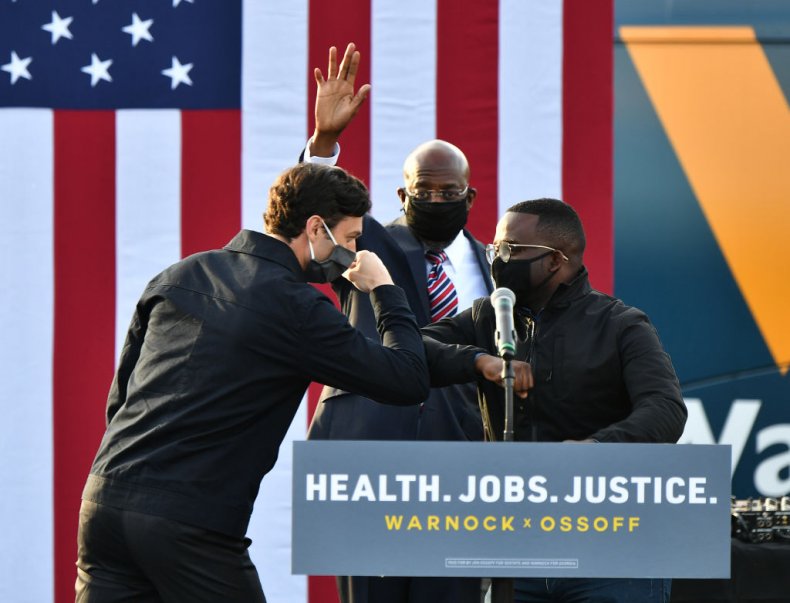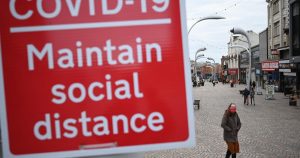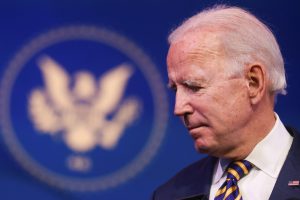Mondale Robinson calls them “fake shop talk” videos, the carefully coordinated discussions filmed by campaigns every cycle of Black men in barbershops, supposedly telling it like it is.
But the head of the Black Male Voter Project, which is working to get out Black men in Georgia for the Senate runoffs on January 5 as it did for the general election, said those ubiquitous setups are contrived, in no small part because once there are cameras, white people and women at the events, the conversation ceases to be genuine.
Robinson knows the importance of finding out what Black men really care about. His group, which operates in 17 states, is laser-focused on a universe of 460,000 Black men in Georgia who did not vote in the six previous federal elections before November, meaning they did not vote for Obama in 2008 or 2012, or Stacey Abrams in 2018.
Where others see an electoral lost cause, Robinson said his unconventional approach, seeded by figures like Abrams and amplified by like-minded groups, helped lead to 104,000 of those men voting in November.
He’s trying to do it again now under more difficult circumstances.
Runoff elections traditionally see drop-off from Democratic base voters and voters of color, meaning Jon Ossoff, who received 90,000 votes less than Senator David Purdue, and the Rev. Raphael Warnock, who faces Senator Kelly Loeffler head-to-head, instead of in a three-way matchup that favored him on November 3, desperately need to get out as many so-called “low propensity” voters as possible.
Robinson wants to show Black men are “not a big, bad monster people see in their minds,” but also worthy of a thoughtful approach. He cites Maslow’s Hierarchy of Needs, the 1943 psychological theory that says base needs like food, water and security must be met before there can be self-actualization, or an interest in more abstract benefits.
Black men, he argued, have the lowest social markers, the shortest lives, underemployed, overcharged by the criminal justice system leading to longer sentences, suspended and expelled from schools, and suffer worse health outcomes.
“These are all political problems,” Robinson told Newsweek. “But the polar ice caps don’t resonate for people living with their backs against the wall.”
Instead, Robinson said he hears repeatedly about three issues from Black men.
They include bringing learning of skilled trades back into schools so these men can take control of their careers because they feel they often lack workplace protections. They also want to end cash bail because of the time wasted in jail, and end qualified immunity for police, which is a term many people learned this year in the wake of the killing of George Floyd by Minneapolis police.
These men may not know the term “qualified immunity,” which shields cops from lawsuits, but they know there is no accountability for the brutalization of Black men by police, Robinson said.
While you have people debating the merits of the messaging of ‘defund the police,’ I wish they would shut up and help us knock on some doors.
Kara Turrentine, a Democratic strategist whose firm worked for Senator Bernie Sanders‘ campaign in Georgia and South Carolina doing direct mail and communications work, said the party must do a better job of explaining how it can change the material life of low propensity voters.
“Their question is ‘How is my life going to be different if I vote Democrat?’ We have to be able to show through policies that impact lives that voting blue is going to do something to improve your condition in this country,” Turrentine said.
Among those who do outreach to infrequent voters, there is a belief that the party as well as Ossoff and Warnock could be doing a better job engaging them.
Jerry Gonzalez, the CEO of the Georgia Association of Latino Elected Officials (GALEO), said that because of this “folks are looking at not so much the candidates, but what’s at stake,” including “COVID relief, getting COVID under control, jump-starting the economy, and immigration reform, which is still what a lot of Latinos are thinking about.”
Robinson pointed to a Warnock ad with police officers that he felt sought to assuage conservatives that Republican messaging about him being anti-police was wrong, as evidence that the candidates don’t fully understand the potential they have within their own base of voters.
“We’re going to win Georgia in spite of our candidates,” he added.
Bakari Sellers, a former state representative from South Carolina and CNN commentator, told Newsweek he spent time talking to people in barbershops and to truck drivers in Georgia and South Carolina during the campaign cycle. While he acknowledged that meaningful outreach can be “tough” during this accelerated timeframe for the runoff elections, he said there is no substitute to actually speaking to these Black men whom he said feel the government has “left them behind.”
“While you have people debating the merits of the messaging of ‘defund the police,’ I wish they would shut up and help us knock on some doors,” he said. “If we want to have the progressive agenda that enhances and changes people’s lives for the next two years, nothing matters more than what happens January 5.”
For his part, Robinson said he held 4,000 conversations and events with Black men in places likes Atlanta, Macon and Brunswick. Away from the cameras, with no white people or women in the room, Robinson would hear unvarnished opinions from Black men who often were politically invisible in the eyes of campaigns and consultants.
He recalled one of the few politicos he let into the room once lecturing the men in attendance about why they didn’t view health care as a top issue when the Black community is disproportionately affected by co-morbidities that lead to complications and deaths.
“Why do I need health care if a cop is gonna shoot me before I’m 30?” a young man said, drawing the attention of the room. “He’s probably going to aim for my head or my heart so I won’t even make it to the hospital.”
The other men agreed.
“Facts.”
“That’s right.”
“True,” they said.
Jon Ossoff, Raphael Warnock and Daniel Blackman speak onstage during the “Vote GA Blue” concert for Georgia Democratic Senate candidates Raphael Warnock and Jon Ossoff at New Birth Church on December 28, 2020, at New Birth Church in Stonecrest, Georgia. Paras Griffin/Getty



















